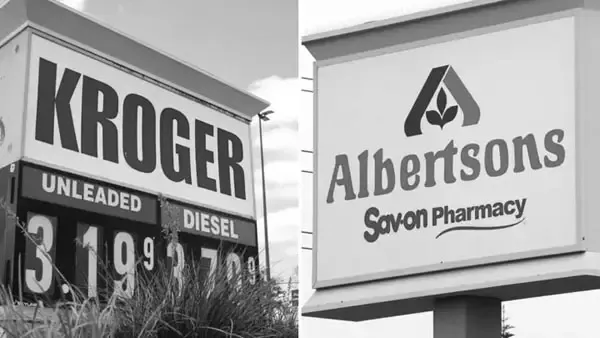NATION — The proposed $24.6 billion merger between Kroger and Albertsons, the two largest supermarket chains in the United States, faces significant regulatory hurdles as the Federal Trade Commission (FTC) challenges the deal on antitrust grounds. For Mohave County, where five stores hang in the balance, the outcome could reshape the local grocery landscape and have far-reaching economic implications.
The FTC filed a lawsuit on February 26, 2024, to block the merger, arguing that the combination would eliminate competition between the two largest supermarket chains in numerous markets across the country. The Commission contends that the merger would lead to higher prices for groceries, reduced quality and selection of products, and diminished wages and benefits for workers.
In Mohave County, the merger would affect five stores: one each in Bullhead City, Fort Mohave, and Lake Havasu City, and two in Kingman. These locations are part of a broader divestiture plan proposed by Kroger and Albertsons to address antitrust concerns. The plan involves selling approximately 600 stores nationwide, including 24 Albertsons locations in Arizona, to C&S Wholesale Grocers.
The merger’s potential impact on local competition is a primary concern. In 2022, Kroger and Albertsons combined held a 13.5% market share of the U.S. grocery industry, according to data from Numerator. The merger would create a company with annual revenues exceeding $200 billion and operating 4,996 stores across 48 states.
Economic implications for Mohave County extend beyond the immediate retail sector. The grocery industry is a significant employer in the region, with ripple effects on local suppliers, commercial real estate, and tax revenues. According to the Bureau of Labor Statistics, the retail trade sector, which includes grocery stores, employed 10,790 people in Mohave County as of May 2023, representing 16.8% of total employment in the area.
Kroger has made several commitments to gain approval for the merger, including:
- Investing $500 million to reduce prices for consumers
- $1.3 billion to improve Albertsons stores
- $1 billion to increase employee wages and benefits
However, critics argue that these promises may not offset the long-term effects of reduced competition. A 2012 study published in the American Economic Review found that mergers in the grocery industry led to price increases of 7.3% on average, with larger price increases in more concentrated markets.
The legal battle over the merger centers on Section 7 of the Clayton Act and Section 5 of the FTC Act. These statutes prohibit mergers and acquisitions where the effect “may be substantially to lessen competition, or to tend to create a monopoly.” The FTC’s challenge reflects a broader trend of increased antitrust scrutiny under the Biden administration, which has seen a 50% increase in merger challenges compared to the previous administration, according to FTC data.
The regulatory process includes several key dates:
- July 31, 2024: FTC administrative hearing begins
- August 26, 2024: Preliminary injunction hearing in Portland, Oregon
- September 30, 2024: Trial start date in Colorado
For Mohave County, the outcome of this process could have significant implications for local economic development. Grocery stores often serve as anchor tenants in commercial developments, influencing property values and attracting complementary businesses. Changes in ownership or potential store closures could impact local real estate markets and community development plans.
The merger also raises questions about supply chain dynamics. Local producers and suppliers may face a more consolidated customer base, potentially altering negotiating dynamics and market access. In 2022, Kroger sourced $9 billion worth of goods from local suppliers across its operating areas, according to the company’s annual report.
Labor market effects are another consideration. While Kroger and Albertsons have committed to honoring existing union agreements, the consolidation of two major employers could alter the landscape for collective bargaining. The United Food and Commercial Workers International Union, which represents 100,000 Kroger workers and 55,000 Albertsons workers, has expressed concerns about the merger’s impact on job security and working conditions.
The Arizona Attorney General’s office has been actively gathering public input on the merger, including a listening session held in Kingman. This local feedback will inform the state’s position as it participates in the regulatory review process.
As the legal and regulatory process unfolds, Mohave County stakeholders are closely monitoring developments. The outcome will not only determine the future of five local grocery stores but could also set precedents for market concentration in rural areas and shape the economic trajectory of the region for years to come.
— Jeremy Webb









